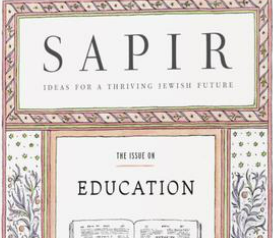 By, Nachama Skolnik Moskowitz This blogpost is a response to an August 5, 2022 posting in the JEDLAB FB group, sharing a lengthy article by Saul Rosenberg. In it, Rosenberg offered an analysis of the challenges of teaching "fluent Hebrew reading in Hebrew School" and hinted towards a solution he is working on. To understand my blogpost, it would be helpful to first read/skim the original article. I apologize in advance for the length of my own response, but as you'll see, it hit a lot of buttons. Rosenberg’s chief concern seems to be that children in a part-time/synagogue educational program (as he notes, “left of Modern Orthodox”) aren’t learning to read Hebrew, which begs the definition of three different skills – reading (which is gaining meaning from the printed page), decoding (which is what I think the author really is talking about – letter > vowel > letter, etc., with no understanding) and reciting (chanting or singing from memory). The science of reading explains that one learns to read
In our part-time synagogue settings, our children do not have enough background or time to learn to read Hebrew or even achieve the thousands of sight words they have in English. Over the decades, synagogues have tried to create smooth decoders, but really, if one can only decode prayers and blessings (or even Haftarah, as the author would like to achieve), one cannot stay up at synagogue speed. Really, it is hard to smoothly read (or self-correct after trying to decode) siddur words like במשמרותיהם or לבבך because these are not words children instantly recognize in everyday language. To pray at synagogue speed, one has to have put the prayer/blessing in memory and then use the print to follow along. I suspect that a native Hebrew speaker who is in 4th grade or even 6th would stumble when asked to “read” the siddur or Torah; the vocabulary and structure aren't known to them. While Hebrew learning is important, I would argue that the way we have been teaching Hebrew in our part-time/synagogue settings has held the curriculum hostage. In some places, we have dedicated many more hours to Hebrew prayer practice than we have to focusing on the big, compelling ideas of Judaism. Hebrew decoding is a skill, but it doesn’t always touch the heart nor help learners grow and “become” in dialogue with Jewish tradition. In the last five years, a new model for Hebrew learning has been spreading across North America. Called #OnwardHebrew, synagogues and part-time programs that have adopted this approach spend years introducing their learners to the sounds of Hebrew, before moving to print. Children learn vocabulary with Hebrew Through Movement (HebrewThroughMovement.org) – an adaptation of the Total Physical Response (TPR) approach that is used to introduce vocabulary of holidays, rituals and prayers/blessings. They are also gain a rich collection of Jewish Life Vocabulary in context – “grab your siddur, we are going to t’fillah” is just one example. And, they pray regularly in Hebrew, learning to chant/sing t’fillot, thus placing words/phrases in memory. Unlike the decades old “traditional” model of learning Hebrew in part-time/synagogue settings, decoding isn’t introduced early, but rather later (often in 5th or 6th grade) which means that learners can take the sounds of Hebrew in their head and attach them to the print on the page. These older children are more experienced and motivated learners – learning moves relatively quickly and seems to stick. Teachers and educational leaders in #OnwardHebrew programs tell us that there is energy and excitement around learning Hebrew in ways they hadn’t previously experienced and that their children show both confidence and competence. Success is expressed differently from what the author of the Sapir Journal article has defined. Our programs have moved Hebrew learning from a bounded time (e.g., Sundays 9:15-10:15 and Tuesdays at 4:30) to one that creates a rich Hebrew environment throughout the time children are with them. And they are able to shift their focus from “Hebrew School” (check out this CASJE research study titled, "Let's Stop Calling it Hebrew School") to programs that create compelling Jewish learning, broadly defined. I'll end with two resources for those desiring to learn more about decoding with an #OnwardHebrew context. For a powerful webinar that provides a great overview, click here: https://youtu.be/0ayl0i0XpLA. For a webinar segment that explores why we are having trouble with Hebrew learning in part-time/synagogue programs and how the “science of reading” might influence changes, click here: https://youtu.be/zBX0Kz8DfJg?t=1487 Want to know more? Feel free to join the conversation on the #OnwardHebrew FB group.
0 Comments
|
AuthorSAll of us! If you have something to contribute, send your posting via the Contact webpage! Archives
September 2023
Categories
All
|
 RSS Feed
RSS Feed